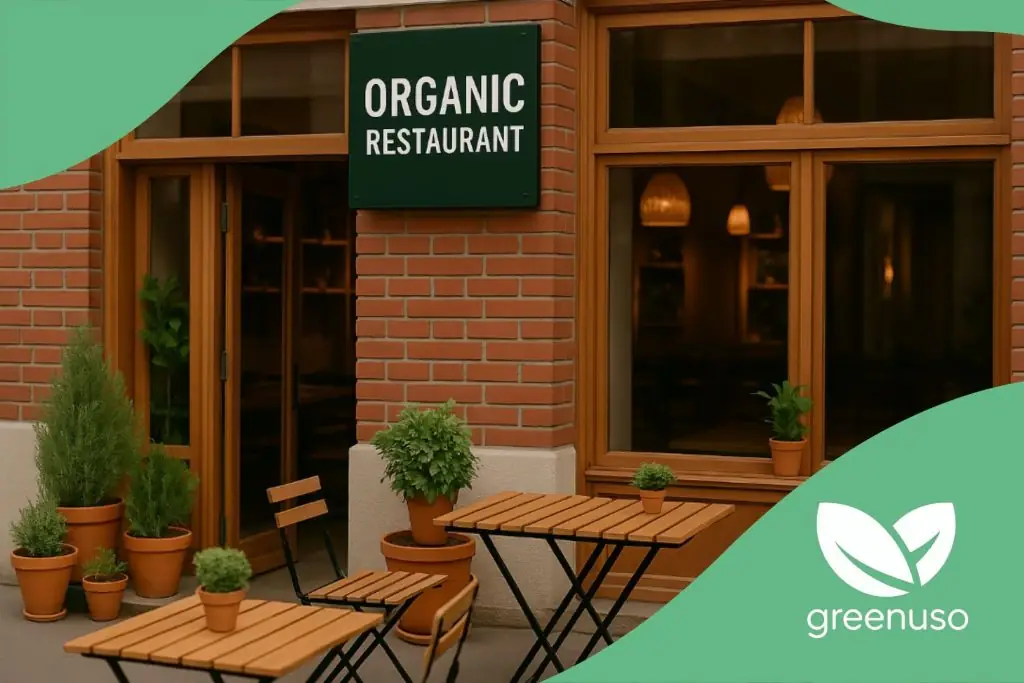Maintaining a healthy diet and contributing to the care and protection of the environment are two increasingly important concerns in today’s society. As awareness grows, so too does the popularity of businesses that align with these values — particularly organic restaurants.
These establishments specialise in dishes made from naturally produced, chemical-free ingredients, and have become a growing trend among health-conscious and eco-aware consumers.
At Greenuso, we’re here to guide you through what defines an organic restaurant and why it has seen such a significant rise in recent years. Ready to learn more? Let’s begin!
What Are Organic Restaurants?
Organic restaurants are food businesses that serve meals made using organic ingredients. These meals are typically simple, nutritious, and full of flavour.
When they ensure the organic origin of their ingredients, these restaurants can offer a wide variety of options, including meat, vegetarian, and macrobiotic menus.
Moreover, an organic restaurant often embraces a fully eco-friendly ethos — from its kitchen practices to its overall image, which consistently promotes its environmental values.

Organic Food and Farming
Organic food is grown without synthetic fertilisers, chemical pesticides, or artificial preservatives. It’s a more natural form of agriculture that focuses on sustainability and environmental protection.
Consumers are increasingly willing to pay a premium for organic food because it’s both eco-friendly and potentially better for their health.
Organic farming leverages natural resources to control pests and improve soil fertility, resulting in healthier food and a more sustainable planet.
Why Are Organic Restaurants So Popular?
The popularity of organic restaurants goes beyond health trends or environmental concerns — it’s about a lifestyle change. Here’s why more people are choosing them:
Promoting a Healthy Lifestyle
Society is becoming increasingly aware of the benefits of a balanced diet in preventing health issues like obesity, diabetes, and even some forms of cancer. Organic restaurants encourage healthier living by offering dishes rich in fruits, vegetables, and legumes.
Transparency and Trust
One of the main reasons for the popularity of organic restaurants is their transparency. Customers are assured that the food they’re served is truly organic and complies with local standards.
This honesty builds trust. Diners know that their meals are crafted from genuine ingredients, free from industrial additives or misleading labels.
Wholesome and Nutritious Cuisine
Organic restaurants serve tasty meals made from seasonal, nutrient-rich ingredients. Common staples include:
- Fresh fruits, vegetables, and leafy greens
- Extra virgin olive oil, coconut oil, and almond oil
- Organic pulses and legumes
- Non-bottled water
- Natural sweeteners like rice syrup, stevia, fruit molasses, or raw honey
- Unrefined salt
- Unprocessed flours
- Free-range eggs
- Organic cheese, milk, and cured meats
- Ethically raised meats
- Fresh fish
Variety and Creativity
Eating healthy can be a delightful experience. Organic cooking enhances the natural flavours of ingredients, resulting in unique and delicious recipes.
What sets organic restaurants apart is their originality — they create innovative dishes full of colour, texture, and taste that appeal to a wide audience.
Natural and Eco-Friendly Décor
Organic restaurants often reflect their eco-conscious ethos in their design. Furniture made from wood or stone, abundant plants, and the use of recycled materials all add to a natural, welcoming atmosphere. Many also take part in social responsibility initiatives and sustainability events.
Sustainable Packaging and Serving
Serving food in biodegradable or eco-friendly packaging shows a strong commitment to sustainability. Consumers of organic food tend to reject packaging made from non-sustainable materials.
That’s why the use of biodegradable plates, trays, and cutlery has become the norm in organic restaurants — it’s a simple yet powerful way to support the plan
Greenuso: Supporting the Organic Restaurant Movement
At Greenuso, we provide a wide range of products that are ideal for organic restaurants. Our materials are sourced from natural, renewable origins, including:
- Sugarcane bagasse: A 100% biodegradable and compostable by-product of sugarcane harvests.
- Cornstarch (PLA): A compostable thermoplastic that looks like regular plastic but is environmentally friendly.
- Palm leaves: Naturally fallen leaves are used to make beautiful, sturdy bowls and plates — no tree cutting involved!
After exploring why organic restaurants are gaining momentum, we invite you to embrace a more sustainable lifestyle.
Would you say yes to 100% organic dining?

